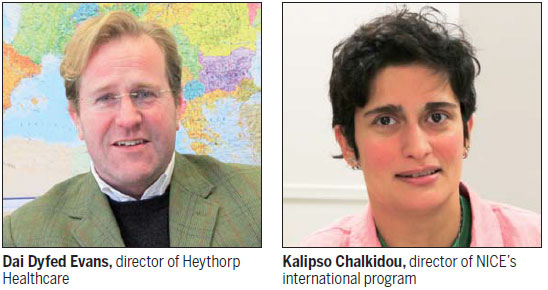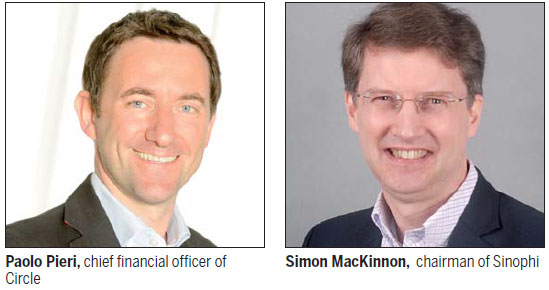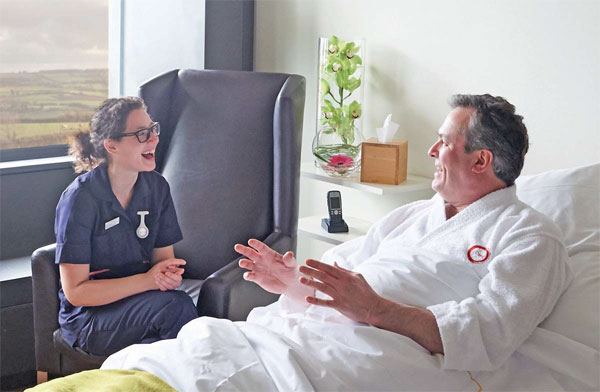UK Hospitals look for Hospitality in China
Updated: 2014-04-25 07:31
By Cecily Liu (China Daily Europe)
|
|||||||||||
|
Circle will work with CITIC to design a healthcare system that better coordinates primary care with hospital care. Provided to China Daily |


Britain is looking to generate funds by giving China doses of its medicine
Britain's National Health Service, which one politician once hailed as "the closest thing the English have to a religion", is quickly making inroads in the Chinese healthcare market.
The service, which employs 1.3 million people, is competing with other countries that export extensively to China's healthcare sector, including the United States and Germany.
Howard Lyons, managing director of Healthcare UK, a government agency set up last year to help sell British healthcare expertise, says this government push is driven largely by the huge amount of interest in the NHS that was generated as a result of the opening ceremony of the Olympic Games in London in 2012. It paid tribute to the 66-year-old service with a skit featuring nurses, children and hospital scenes that could hardly have been more cheerful. There was also a nod to the world renowned Great Ormond Street Hospital for children.
"I think the response after the Olympics confirmed the government view that the NHS is very highly regarded overseas," Lyons says. "On many international indicators, the NHS comes quite highly in transparency, cost-effectiveness and openness. It is something we can share with the rest of the world."
Britain has worked closely with emerging economies like China in healthcare projects that enable it to share its expertise, but historically this has been of a more philanthropic nature, Lyons says.
But in recent years the British government has realized the revenue generating potential in selling its expertise, and it now hopes to pass on its health and medical expertise "in a way that brings some commercial benefits to the UK, at a time we've had a really deep recession", Lyons says.
Contrary to popular belief, the NHS is not one big organization, nor is it limited to the doctors and nurses NHS hospitals employ. Rather, it is a centrally-funded healthcare system that subcontracts to many private companies and providers, who have much more flexibility in reaching out to overseas markets like China.
But unlike German and US exports, dominated by advanced healthcare devices, Britain's healthcare exports center on management expertise and know-how, says Jenny Yao, director of healthcare at KPMG China.
"I think Germany and the US are probably exporting more of their medical devices. The UK is involved far more in soft skills. As we go through healthcare reform in China, the market is opening up for private investment and there will be many opportunities for firms in the UK to invest."
One area for investment is hospital management and strategic planning, in which British companies are helping Chinese partners, as hospitals and healthcare centers spring up throughout the country.
Sinophi Healthcare, which signed contracts for hospital management and hospital investment worth 120 million pounds ($199 million; 145 million euros) when Prime Minister David Cameron visited China in December, is helping Huai'an First People's Hospital build a 1,000-bed oncology hospital.
Simon MacKinnon, chairman of Sinophi, says it plans to work with an NHS hospital trust, a private company, that provides renal care to bring such expertise and dialysis services to the hospitals in China that Sinophi helps to build.
Another British company, Heythorp Healthcare, will invest in China-UK Healthcare Park in Nanjing, together with Jiangsu Far East Group. The park will comprise 56,000 square meters of mixed-use healthcare space and include nursing care, a rehabilitation center and private care clinics.
Dai Dyfed Evans, director of Heythorp, says the mixed-use complex is designed to provide post-operative recuperative care away from the normal confines of a hospital.
Construction is expected to begin in 2016, and Heythorp is now looking for investors, Evan says.
Heythorp aims to facilitate knowledge transfer by enabling doctors and nurses from NHS hospitals to train local Chinese doctors and nurses. Areas of medical practice could include elderly care, dementia, diabetes, respiratory conditions and rehabilitation, he says.
Evans says this model is effective because while the NHS hospitals benefit from the training revenue generated in China, they do not need to bear the risk of investing in hospitals there, the kind of thing companies like Heythorp are doing.
Heythorp has also established a partnership with the Chinese investment company CITIC Group to develop a rehabilitation and post-operative care center in Kunming, Yunnan province. It will be a 2,000 sq m pilot space, as a part of a larger healthcare complex owned by CITIC.
Circle, which in 2012 became the first private company to run an NHS hospital, will also advise CITIC on the healthcare complex in Kunming.
Paolo Pieri, the chief financial officer, says Circle will work with CITIC to design a healthcare system that better coordinates primary and hospital care.
"We'll hopefully train consultants, and set up a system that replicates that of the UK. We can have processes to monitor conditions rather than treating conditions, so we may allay some fears for people who may have long-term illnesses, like high blood pressure, diabetes and degenerative diseases."
As well, Pieri says, Circle will use its service expertise to help CITIC create a system that gives Chinese patients the most suitable care. For example, it is looking at ways in which Chinese traditional medicine can be integrated into what is provided.
Another British company providing consultancy services in China is EC Harris, which is helping Dalian Vitup, a company in Dalian, Liaoning province, to set up a new health and senior care facility.
In the process, EC Harris is working with architects and developers to construct a good environment for senior care to be delivered.
"If facilities don't have community and retail facilities, then nobody would want to live there, and it won't be a viable opportunity," says Karen Prosser, head of the health division at EC Harris.
EC Harris has identified how the use of software can ensure an adequate number of staff are well trained in senior care, as well as using IT and technology to ensure patients can live independently.
"It could be as basic as a call button," Prosser says. "Also, the use of telemedicine is important. For example, telemedicine enables clients to take their blood pressure at home, linking them to a nurse who can speak with them and check how they are. This enables patients to live at home for a bit longer."
The new health and senior care facilities are expected to open within the next two years, Prosser says. "In the meantime, EC Harris will also work to find suitable private hotel operators in Britain to help manage the Dalian projects.
Apart from consulting for new hospital management, the UK can also realize great benefits by sharing with China its expertise in providing primary care, says Mark Gilbraith, the healthcare and pharmaceuticals leader with PricewaterhouseCoopers China.
In Britain, 10 percent of all healthcare interaction takes place in hospitals, but in China 90 percent of primary care, interaction takes place in hospitals, Gilbraith says.
The key enabler for the UK's effective primary care system is the national level single payer healthcare financing model, which means funding comes from a single source regardless of the type of delivery, he says.
While China could adopt some primary care management expertise from Britain, it needs to fit the new concepts within the country's current copayment based healthcare financing model, he says.
In response to China's demand for well-qualified primary care doctors and other practitioners, British organizations such as the Royal College of Surgeons and the Royal College of General Practitioners in Britain are gradually expanding their training courses in China, delivered through accredited centers.
"There is an increasing desire among leading Chinese surgeons to develop national standards for training," says Peter Lamont of the Royal College of Surgeons.
His words are echoed by Sandra Mather of the Royal College of General Practitioners, who adds that the advantage of its training and assessment in China is its ability to adapt to the local context, practices and diseases.
"We take direction from the medical leaders for their country, and the courses are suitable for their culture and their diseases," Mather says, adding that about 60 percent of the course material is standard content globally and 40 percent locally.
After gaining accreditation from the Royal College of General Practitioners, Chinese general practitioners can then enjoy the same benefits as the college's members in Britain, including workshops and reading material. In addition, the college also runs three-week short courses that take Chinese GPs to Britain to witness their counterparts at work.
Mather says she sees great opportunities in providing training for Chinese GPs because this is an area on which Chinese policymakers are focusing, and because many Chinese GPs lack proper training.
Many Chinese GPs she has met on the short training program have received only about a year of solid training, whereas GPs in Britain would all need to complete their undergraduate degrees over five years, followed by two years of foundation practice and another three years of training as a GP.
Research also holds great potential for collaboration between China and Britain. Traditionally, such collaboration between the two countries has taken place in universities, facilitated by organizations such as the Research Council UK.
But more recently commercial benefits that can be derived from research projects have attracted more private companies to move into this market, one of them being Ixico, a British research and technology company.
Ixico has expertise in research on dementia and is now working with Beijing Union Medical and Pharmaceutical General Corporation to evaluate new treatments.
Derek Hill, CEO of Ixico, says it has operated in China since 2008, focusing mostly on data sharing and collaboration, but now it hopes to further implement its technology in the country.
"The research we conduct in China will be useful for both China and the UK because, like China, the UK is also committed to improving the care of current and future dementia patients and, ultimately, to finding a cure or treatment for dementia."
Ixico has worked with more than 30 of the best-equipped hospitals in Beijing, Shanghai and Guangzhou since 2008. It has trained more than 100 neurologists, psychiatrists and radiologists, and accredited dozens of imaging centers of tier-three hospitals to conduct clinical research on vascular and neurodegenerative diseases.
Despite the numerous economic opportunities already realized, Hill says there are many more aspects of Britain's healthcare system and expertise that can help China on its way to reform.
Hill says one example is the way the NHS ensures equality and access by providing universal coverage and keeping costs down. This is achieved by evaluating the benefits and costs of new drugs so that those that cost more than the value they contribute will not be approved by the NHS, he says.
Something else China can learn is how to manage private and public doctors centrally, so they can practice in both public and private hospitals with the right incentives and charge fairly.
On a government exchange level, Lyon says, Healthcare UK will strive to share a lot of its knowledge and expertise with Chinese partners with the goal of building a long-term relationship.
Nothing will be charged for the knowledge passed on, but a good relationship could lead more Chinese organizations to buy more products and services from British firms.
This mentality is also at the core of the work the National Institute for Health and Care Excellence is doing in China, says Kalipso Chalkidou, founding director of Nice International.
Apart from the desire to help build a good relationship that in the long term benefits British firms, Nice International is keen to be a part of China's healthcare reform, she says.
"We feel quite privileged. This is the biggest reform on the planet ever. If you manage to provide (healthcare) for 1.3 billion people, then that will change global indicators."
Since 2009, the institute has been involved in rural health reforms in China, analyzing data collated from rural areas and giving suggestions on how to improve the quality of services and seek better results for various projects.
In particular, Nice International helped the Chinese government assess diseases common in China, like stroke and lung disease.
Together with its Chinese counterpart, the China National Health Development and Research Center, a think tank, Nice International produced a report on its views and suggestions, some of which are now being implemented.
This includes discharged hospital patients not having to hand over money for medicine that they need later. Rather than village centers taking a large fee for the medicine, a new model is being piloted in some cities in which patients can receive medicine in village centers without having to pay.
Chalkidou says Nice International is now working with the Chinese government on preventing diseases. Its work in China has received so much positive feedback that other emerging markets like Vietnam are now learning from this cooperation model, she says.
Britain also has great prospects in sharing with China its expertise in healthcare infrastructure development, healthcare workforce development and digital health technologies, says Sandy Johnston of PricewaterhouseCoopers China.
Britain's experience in implementing public-private partnerships in building new healthcare infrastructure, for example, is particularly relevant for China because China is aiming for healthcare reform that attracts private capital, Johnston says.
cecilyliu@chinadaily.com.cn
(China Daily European Weekly 04/25/2014 page16)
Today's Top News
EU: No armed intervention in Ukraine
Chinese premier visits Nigeria
Court to rule on Yingluck in Thailand
Travellers to Malaysia drop
Chinese to US grad schools drop
Ukraine moves special forces to Odessa
Slovenian PM resigns
Disclosure of military secrets becoming bigger risk
Hot Topics
Lunar probe , China growth forecasts, Emission rules get tougher, China seen through 'colored lens', International board,
Editor's Picks

|

|

|

|

|

|






